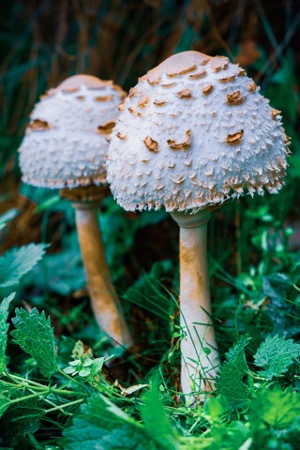Autumn is the perfect time of year for mushroom hunting. The weather is not too warm, not too cold, and it's extra damp. This is mother nature's way of telling all the mushrooms it's time to come out. Many people enjoy mushroom hunting, but is it possible to break the law while doing it?
George Seryogin is a renowned wild mushroom expert and active forager who leads groups of aspiring mushroom hunters on organized trips several times each year, at different hotspots around the country. We spoke with Mr. Seryogin to get some of his tips for beginners.
While mushroom hunting in itself isn't illegal in the United States, there are rules and regulations to be aware of before going out to forage these edible morsels. Here's what you need to know before you go out for your hunt.
1. Know Where You're Going
George Seryogin notes that as the pastime of searching for morels becomes ever
more popular across the United States, it's also become easier. Tours, clubs, events, and how-to guides are springing up everywhere. When you're with a group, it's easy to follow along. But if you're going at it alone, having a destination is key.
This is because while mushroom hunting in itself is legal, where you do it is another question. Here are some things to consider before you choose a place to forage.
2. Research Local Laws
A good rule of thumb is to forage on public lands. Knowing what lands are public and where your local government will allow foraging is another matter. And the laws about foraging may depend on what kind of public space you are in.
One project called
Falling Fruit is working to make it clear where enthusiasts can and can't forage. This is a good place to start for any beginners. Once you become familiar with your local regulations, you can start to branch out to other good searching spots.
3. Don't Hunt on Private Property
Trespassing is taken seriously regardless of the state you live in. This could lead to consequences such as fines, jail time, and a mark on your record. While somewhere may be a great spot for mushrooms, it doesn't mean it's open to foragers.
4. Rules Vary in Parks
While the state owns parks, that doesn't mean that only state laws apply. Each park may have different rules about whether foraging is allowed. For example, Three Rivers Park has a general ban on collecting any natural objects, although its state of Mississippi allows for some collecting on state parks.


5. Get the Necessary Permits
George notes that some locations may allow for foraging, but only if foragers have a permit. If that's the case where you are, you don't want to be caught without one of these. Having a permit not only shows that you have permission to forage, but it will also direct you to the rules of the forest.
When getting your permit, pay attention to any location-specific rules about what can be picked, how much of it, and where. For example, you may need to avoid off-limit areas like research fields.
6. Know How Much You Can Take
Once you've found a place to forage, know how much you can take with you. Some state parks may have regulations about collecting only “
reasonable amounts”. Others may expressly prohibit anything above a maximum such as more than “one bucket”.
To ensure that any fungi don't go to waste, there's plenty there for all, and to avoid problems with park and local authorities, only gather to the local rules' limit.
7. Don't Sell Foraged Mushrooms
Many of the laws around foraging are to promote everyday citizens to gather from public land for a family's consumption and fun. However, the government wants to avoid companies taking advantage of free mushrooms only to turn around and sell them to citizens who could have foraged for them for free.
Part of this goes back to knowing how much you can take. Part of why there is a limit is to ensure you only take what a person or family could reasonably consume. Larger quantities make it more likely that the gathering isn't just for personal use or enjoyment.
If you have a permit for gathering on federal property, selling any amount of mushrooms could put you in violation of federal law and lead to large fines. To be on the safe side, just keep any mushrooms you find to yourself or as gifts to friends and family members.
8. Watch Out for Rare Species
There are thousands of mushroom species in the world. Certain species thrive in different areas. And of these thousands of species, hundreds are classified as rare, threatened, or even endangered. To protect the area's biodiversity, local laws may prohibit taking any rare fungi.
When you're in a new area, acquaint yourself with which species may be off-limits. This way, you know you can't be in trouble with authorities, and you can rest easy knowing you didn't cause any harm to a local species.
Conclusion — Hunt Mushrooms Responsibly
Foraging is a great activity for nature enthusiasts and families. You should always be aware of safety concerns such as only bringing edible mushrooms with you. But also make sure that you aren't breaking any government laws and regulations. This fall, keep your mushroom hunt safe, fun, and completely legal.
Disclaimer: George Seryogin is not a certified expert in mushroom hunting. Information provided is for reference only.

